
Memorial Day is a federal holiday in the United States for mourning the U.S. military personnel who have died while serving in the United States armed forces. It is observed on the last Monday of May. It was formerly observed on May 30 from 1868 to 1970.

Jabez Lamar Monroe Curry was an American Democratic politician from Alabama who served in the state legislature and US Congress. He also served as an officer of the Confederate States Army in the American Civil War. He was a slave owner and supported the Southern cause.

Robert Anderson was a United States Army officer during the American Civil War. He was the Union commander in the first battle of the American Civil War at Fort Sumter in April 1861 when the Confederates bombarded the fort and forced its surrender to start the war. Anderson was celebrated as a hero in the North and promoted to brigadier general and given command of Union forces in Kentucky. He was removed late in 1861 and reassigned to Rhode Island, before retiring from military service in 1863.

Alfred Moore Scales was a North Carolina state legislator, Confederate general in the American Civil War, and the 45th Governor of North Carolina from 1885 to 1889.

John McAllister Schofield was an American soldier who held major commands during the American Civil War. He was appointed U.S. Secretary of War (1868–1869) under President Andrew Johnson and later served as Commanding General of the United States Army (1888–1895).
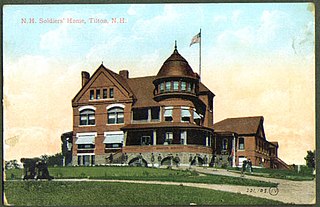
An old soldiers' home is a military veterans' retirement home, nursing home, or hospital, or sometimes an institution for the care of the widows and orphans of a nation's soldiers, sailors, and marines, etc.

James Lawrence Orr was an American diplomat and politician who served as the 22nd speaker of the United States House of Representatives from 1857 to 1859. He also served as the 73rd governor of South Carolina from 1865 to 1868 after a term in the Confederate States Senate.

Russell Alexander Alger was an American politician and businessman. He served as the 20th Governor of Michigan, U.S. Senator, and U.S. Secretary of War.

Jacob Thompson was the United States Secretary of the Interior, who resigned on the outbreak of the American Civil War and became the Inspector General of the Confederate States Army.

Mount Olivet Cemetery is a 206-acre (83 ha) cemetery located in Nashville, Tennessee. It is located approximately two miles East of downtown Nashville, and adjacent to the Catholic Calvary Cemetery. It is open to the public during daylight hours.

Alexander Quarles Holladay LL.D. was an American lawyer, state senator and college administrator.
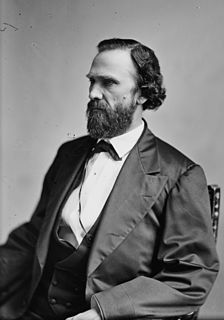
John DeWitt Clinton Atkins was an American slave owner, politician and a member of both the United States House of Representatives and Confederate Congress from Tennessee.
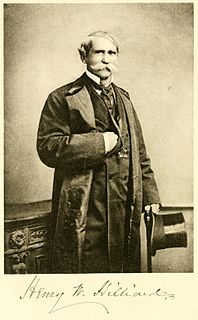
Henry Washington Hilliard was a unionist U.S. Representative from Alabama and a general in the Confederate States Army during the American Civil War. In later life, he became a proponent of abolitionism in Brazil.

Eli Thomas Stackhouse was a U.S. Representative from South Carolina and an officer in the Confederate Army of Northern Virginia during the American Civil War.
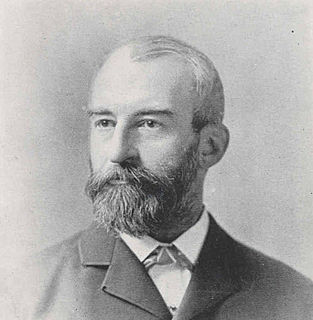
William Hayne Perry was a United States Representative from South Carolina. He was born in Greenville, South Carolina, where he attended Greenville Academy, and graduated from Furman University at Greenville in 1857. He also attended South Carolina College at Columbia, South Carolina and graduated from Harvard University in 1859. Later, he studied law in Greenville and was admitted to the bar in 1861 and commenced practice in Greenville.

Robert Rufus Bridgers was a Confederate politician during the American Civil War.

Brigadier-General George Earl Maney was an American soldier, politician, railroad executive and diplomat. He was a general in the Confederate States Army during the American Civil War and a postbellum U.S. ambassador to Colombia, Bolivia, Uruguay, and Paraguay.

Colonel John Peyre Thomas Sr. was an educator, politician and historian who served as 6th Superintendent of the South Carolina Military Academy.
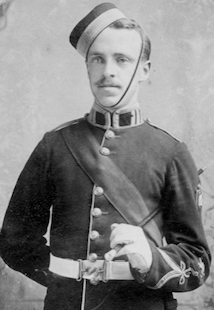
Lieutenant Charles Carroll Wood was the first Canadian Officer to die in the Second Boer War. As a member of a family that had distinguished itself in America, his great grandfather being Zachary Taylor, 12th President of the United States, he was buried with full military honours.
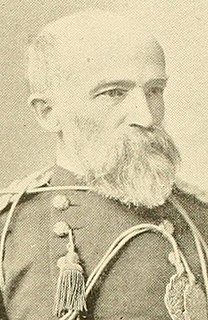
Henry W. Closson was a career officer in the United States Army. A veteran of the American Indian Wars and the American Civil War, he served from 1854 to 1896 and attained the rank of colonel. During the Civil War, Closson received brevet promotions to major and lieutenant colonel to recognize his heroism during the Siege of Port Hudson, Louisiana and Siege of Fort Morgan, Alabama.




















